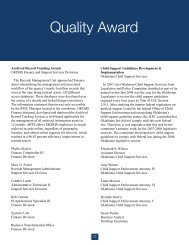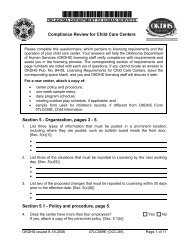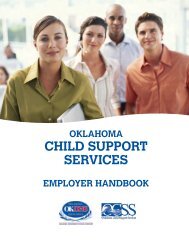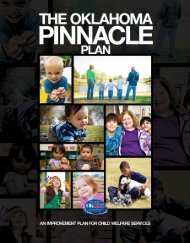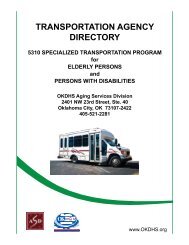Okdhs Child Welfare Assessment Recommendations - Oklahoma ...
Okdhs Child Welfare Assessment Recommendations - Oklahoma ...
Okdhs Child Welfare Assessment Recommendations - Oklahoma ...
Create successful ePaper yourself
Turn your PDF publications into a flip-book with our unique Google optimized e-Paper software.
OKDHS <strong>Child</strong> <strong>Welfare</strong> <strong>Assessment</strong> <strong>Recommendations</strong><br />
Performance<br />
Areas<br />
Schusterman<br />
<strong>Recommendations</strong> ==><br />
Overall<br />
<strong>Assessment</strong>s and Treatment<br />
Increase the number and quality of<br />
professionals trained to work with<br />
child victims of trauma<br />
Why: In FY2010, 7,248 <strong>Oklahoma</strong><br />
children were confirmed victims of<br />
abuse and neglect.<br />
Mental health<br />
Why: <strong>Oklahoma</strong> ranks 46th in the<br />
nation for mental health services.<br />
Sexual abuse<br />
Why: In FY2010, 744 children in<br />
<strong>Oklahoma</strong> had confirmed cases<br />
of sexual abuse.<br />
Domestic violence<br />
Why: Domestic violence and<br />
child abuse research shows<br />
a co-occurring rate as high<br />
as 55%.<br />
Substance abuse<br />
Why: An estimated 50 to 80<br />
percent of children in state<br />
custody have a parent who<br />
abuses alcohol or other<br />
drugs. More than 71% of<br />
youth who use stimulants<br />
non-medically engage in<br />
other delinquent<br />
behaviors.<br />
Early intervention and<br />
referral for treatment<br />
services<br />
Why: Immediate<br />
assessment and services<br />
give children and youth<br />
the best chance of<br />
surviving abuse and<br />
neglect.<br />
<strong>Child</strong> Protective<br />
Services<br />
Prevention<br />
Services<br />
<strong>Child</strong> and Abuse<br />
Neglect in Care<br />
Listen to children’s insights about<br />
conditions<br />
in the home, placement problems, and<br />
their<br />
needs<br />
Why: <strong>Child</strong>ren in the foster care system<br />
have expertise that comes only from<br />
experience. They should be heard and<br />
part of the solution.<br />
Foster Care<br />
Number of<br />
Available Foster<br />
Homes<br />
Recruit, train, retain, monitor, and pay<br />
quality foster and kinship families<br />
Why: More diverse families with<br />
quality training, support, and fair pay<br />
are needed for foster children to<br />
overcome trauma.<br />
Frequency and<br />
continuity with<br />
which child<br />
welfare case<br />
workers visit<br />
children<br />
Page: 30 of 41







